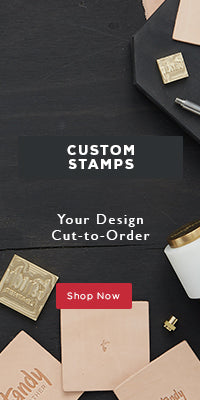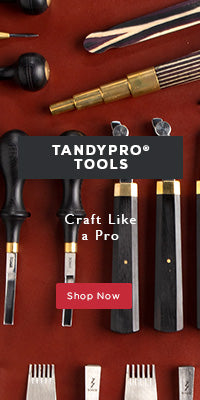All Leathercraft Library patterns and projects are property of Tandy Leather. Projects and patterns available are a part of the Tandy Leather Archive and may contain outdated product information or service offerings. Projects and patterns can be reproduced for personal use by printing, but Tandy Leather cannot guarantee the quality of reproduction or printing due to the image quality available. Some project and pattern themes or motifs may not be representative of Tandy Leather’s current views.

All About Awls

All About Awls
Awls are, for all intents and purposes, one of the most versatile and handy tools you can have in your tool box. Unlike many other crafting types, leatherworkers can get by with relatively few tools, but awls rank among not only the most useable but also fairly low cost!
So, what's the big deal which one of the many awls available is the one you need?! Let's get into it!
WHAT IS AN AWL?
Awls are hand tools, made up of a handle, often made of wood, and a sharp metal blade. They are often used for piercing, widening holes or scoring and tracing. There are a variety of types of awls, all of which have an important role in our crafting processes.
FIXED BLADE VS. AWL HAFT
One of the first big things to consider when purchasing your awls is whether or not to get a fixed blade awl, one in which the blade is permanently affixed to the handle or an awl haft with interchangeable and differently shaped blades. While they both have their benefits, it is an important question to ask.
TYPES OF AWLS AND PARTS
Awl haft + awl needles: much like an electric drill and a drill bit, this functions by loosening the neck of the haft, inserting the needle and tightening the collar around it. There are all shapes and sizes of needles available for these handles and can take up such a small space in your crafting box! They're portable, replaceable if they break or dull and highly versatile.
Curved awl: these are a great tool when a flat or straight blade isn't an option- like shoe soles or when joining pieces together over a rounded surface. This awl can help create a more natural flow for leather goods that have odd or non geometric shapes for a finished project that falls just how you want it.
Diamond awl: one of the most popular awl types, the diamond point on this awls is extremely sharp and creates a small hole when used to puncture leather. When sewing through holes like these the leather can form a tight fit around thread so there are limited gaps in the finished stitch line. Another perk- they tend to match the shape of diamond stitching chisels and can be used to help open stitching holes without deforming the leather!
Lacing awl/Stitching fid: as the name implies, this awl is meant to assist when lacing your projects. There are a few different types, some meant to assist pulling your lace through and others meant to widen the gap so stitching needles and lace can get through more effectively.
Scratch awl: this is a generic, all purpose, all around great tool. One of the more universal tools in the toolbox, scratch awls have a super sharp tip on the blade, but the shaft is round and smooth. A great tool to trace patterns, mark hardware holes, etc. Anywhere you might use a pen or pencil you can substitute your scratch awl!
Speed stitcher/Lockstitch awl: these are one of the most complex awls but a handy tool for stitching or even repairs! This awl has a built in bobbin loaded with waxed thread. By threading the needle with the built in thread you can pierce holes and sew at the same time. They may not be perfect for every application, but they're definitely worth having at your fingertips when needed!
Stitching awl: this is tool that's somewhere between a diamond awl and a scratch awl. Another great all around tool it's meant to assist with stitching. A heftier handle and shorter blade, this offers a lot of control and protects from damage when using a fixed blade!
IN CONCLUSION
Each of these tools has its benefits and uses, and while all of them may not be necessary, having a variety of them at your fingertips will help you create the perfect project every time. Stop by your local Tandy Leather store for a chance to see any of these items in action!






Comments
Leave a comment